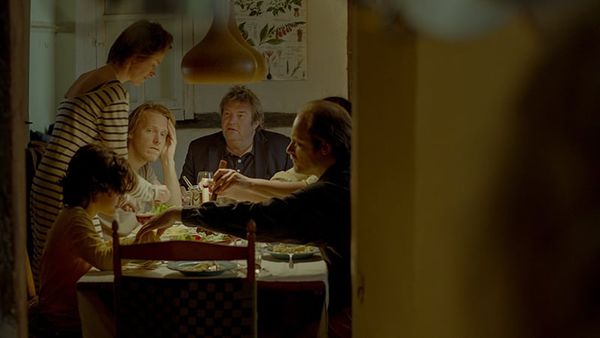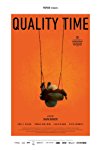Eye For Film >> Movies >> Quality Time (2017) Film Review
Quality Time
Reviewed by: Andrew Robertson

Some films could do with an editor, others with a bit of a re-write. It's a good rule of thumb that the more writers a project has credited the worse it is, but on the other hand it's also a good rule of (the opposite?) thumb that projects with the same writer and director can be self-indulgent. If this seems like a bit of an odd opening to a review, reader, it has nothing on Quality Time. Inside this five-part feature are some bits of cinema that should be cut free as decisively as Solomon arbitrating custody disputes, because they are great. Around them are also some bits that don't work, that grate, that actively and persistently annoy. Some just disappoint, and that makes Quality Time all the more frustrating.
Consisting of five thematically linked sections, each in a way dealing with particular crises of masculinity and maturity, the film opens with an animated segment, Koen. It's almost certainly over-reading it to look at the name and the presence of ham and milk and think that something isn't quite kosher, and that's mostly because there's little to read but the sub-titles. Vocal performances are masked by distortion that has the air of ring-modulation and all other presence is masked by representation of figures as dots. Dots that sometimes change size. Dots called Uncle Ben whose colour couldn't quite be parsed on a laptop-screened screener. Film through minimalism, a family-reunion and tradition as rendered by Microsoft Paint. There are some neat touches, but even before it ended I was hoping for the strobe and squall of even more experimental film. There's tension in its artifice, dots of people but more closely rendered ham, milk, milk, ham. Let's say, glass half empty, that it's a hurdle. If one can't skip it, consider violating every acceptable norm and arriving slightly late.

Not too late, however - because immediately after that minimalism is a different minimalism in gorgeous relatively-fixed cameras - that caveat because of drone shots, of moving cars, cars that sit specifically and motion-matched. Again subtitle on screen, representative of motion when things are unseen. Tableaux, even landscapes, sometimes punctuated by visible motion of figures, often not. Text as presentation. Presentation in text. Stefaan's therapists advice, as he moves back with his parents, "removing computers from the house". Nurtured, chauffered, in that return to the nest, he has a photo project. This segment I adored. It's gorgeous, nuanced, formalism - the strum-guitar freakout at its opening - repeated exercises in tension created with minor motion, score, sound, an absolute control of scene that makes Wes Anderson seem slapdash. Stefaan's photo project, one made possible by his father as chauffer, makes chapters within the chapter, and it's an absolute gem, crisp, well-observed, bleak and comic in its restraint and its excesses. From some distance above we watch a child archeologist threatened, and that is not even one corner of the ways in which this part impresses. "quite minimalistic, isn't it", observes a character concealed by a roof. Like The Last Photograph, Stations Of The Cross, document so convincing as to seem documentary, a hyper-realism. Accurate in microcosm, this section alone justifies the rest.
Which makes the circularity of section 3, KJell, all the more complex - I was impressed, again, by a synthesis of ideas and execution that made me think of obscure Iranian works like Fish & Cat and "mainstream indie" like Primer or Knights Of Badassdom and a distorted coming of age of other northern European short festival fare like Megaheavy, and a clarity of vision that managed to muddy itself but on purpose, an act of ongoing storytelling, one that ends in a forest jazz-jam, with a screen crowded with text in place of narrator, one who has made himself unreliable, and is not himself the narrator, and a time travelling Peugot.
Karel has alien abduction, an explosion, Jef asparagus a la flamande. Further thematic developments of visiting parental homes, in-law-parental homes, and while at times both surprising and amusing never quite reaching the heights or depths of the earlier sections. Juxtapositions of Pentecost and constructing homes on the river for children called Noah, cuckoos returned to the nest by white beam from the heavens, bins full of piss and windows covered in meat, meat covered by ketchup, hidden fish, watching people watching someone playing the guitar, there are observations as good as some of those elsewhere demonstrated but nothing that stuns and delights as much as watching a leaf-blower operator from somewhere in the sky.
Quality Time will not be to all tastes, indeed, even though I liked it mine is not the first attempt Eye For Film had at reviewing it. Often when discussing the perks of film criticism folk will not even be cognisant of the benefits of having a cupboard in ones home full of tote bags, or that we are never short of a lanyard, or what it is to hear the name of a cinema and be able to map not only the least uncomfortable seat in every screen but the most proximate vendors of caffeine and sandwiches (and always in that order). No, it's "getting to see films for free."
The problem is that you don't always get to choose. There might, then, though I'm possibly reaching here, be something then in Quality Time in that there are bits that must be endured before the fun stuff. It's less of a reach to suggest that it's an exploration of existential crisis - the soundtrack(s) make use of pieces by Nick Cave and Warren Ellis, not (I think) as Grinderman but from another soundtrack, that of Loin Des Hommes - so here we have meditations on masculinity borrowing from Camus as scored by someone who wasn't in Dogs In Space and the guy who wrote Ministry Of Space, with people who have been through space or are trying to recapture time.
If I had seen some thirds of Quality Time in a couple of weeks at Glasgow's Short Film Festival I'd be talking about it for ages - as it stands I think it's an excellent demonstration (in places) of Daan Bakker's agility and ability as a writer and director. Cut apart, bits of it would, do, cut to the bone. Together, like many of its protagonists, it disappoints a little despite potential. Which might, one supposes, be the point. As a man in his thirties who is fond of film I must admit that depictions of other men in their thirties undergoing some degree of crisis is not what I would want but it's nice to be targeted as a demographic for neurosis rather than for, say, razors or action figures, but the bits that felt like car commercials did so in a way that worked as a further interpolation of observation in a segment (Stefaan) that was about ways of seeing.
In truth I think that navel-gazing would (and probably ought) to be off-putting to those whose navels are nearer to where they were ten years ago, and possess about the same quantity and colour of hair. That fleshiness is made good use of in Karel, but the very nature of its opening is off-putting. I want to, and will, say that Quality Time is a four star film - to abstract all sorts of other qualities to a single noise to save you time - but the reason it's taken me, um, 1236 words or so to get around to it is because I am deeply conflicted about it. I'd rather, I suppose, that it had been butchered, and the choicest morsel served for delectation - what's at stake is that this is a body of work, a carcass, and my beef is that it's messy and un-trimmed and that it needn't be. It feels too arch, however, to suggest that my discomfort with a decision about the film is intended, and vexingly (for both of us!) I'm still not quite sure why.
Reviewed on: 05 Mar 2018















